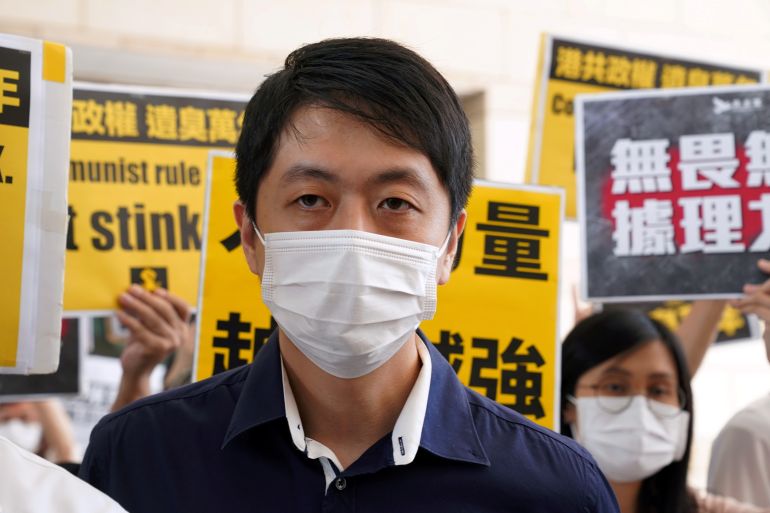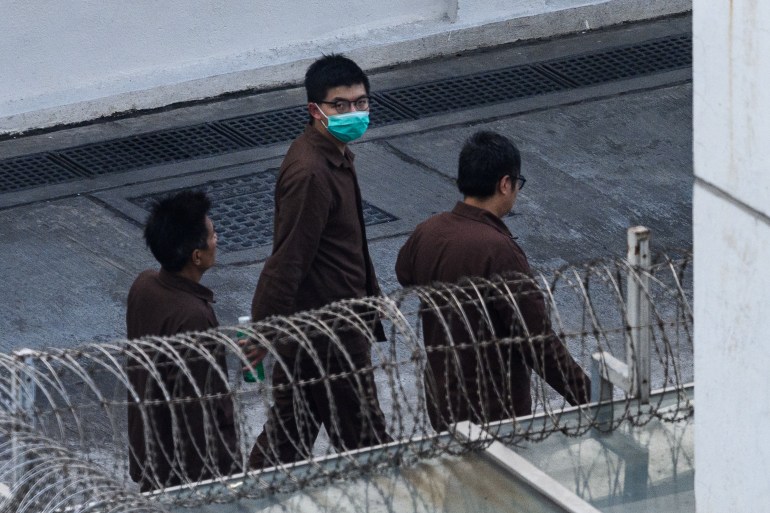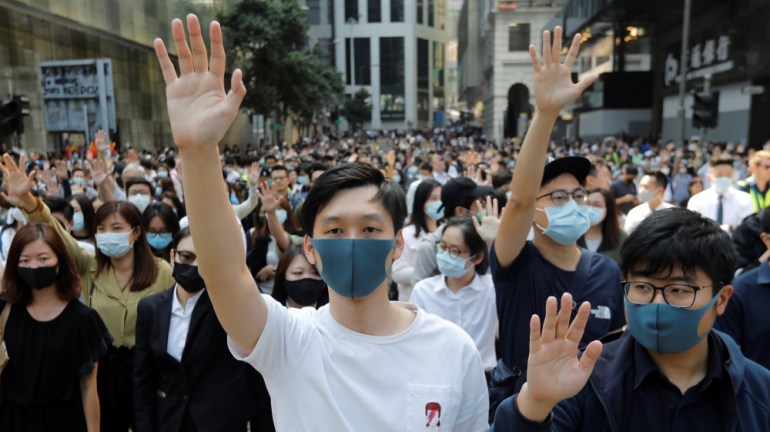Hong Kong’s prominent democracy activists face agonising choice
Former legislator Ted Hui the latest to go into exile, as cases mount against those who took part in 2019 protests.

Hong Kong’s high-profile activists and legislators increasingly find themselves having to choose between whether to stay in the Chinese territory and face arrest, or leave – possibly for good – as the government continues to step up political prosecutions.
This week three of Hong Kong’s most well-known activists, Joshua Wong, Agnes Chow and Ivan Lam, were jailed for taking part in protests last summer on charges of incitement and organising an illegal assembly.
Keep reading
list of 4 itemsHong Kong activist Joshua Wong jailed for 2019 protest
Hong Kong’s Lam vows to restore stability, order after ‘chaos’
UK mulls pulling judges from Hong Kong in wake of security law
Hours after the trial concluded, police rearrested media tycoon and critic Jimmy Lai and two of his colleagues from Next Digital, and Lai was later denied bail over fraud charges. He will remain in custody until his trial starts in mid-April.
On Friday, it emerged that former democratic legislator Ted Hui, who was among eight activists arrested earlier this month, would remain abroad with his family after a short trip to Denmark. In a Facebook post, Hui said he had chosen “exile”, with activists like Nathan Law, after friends encouraged him not to return home.
“Probably, staying in Hong Kong is going to mean jail time for all legislators and activists who participated directly in last year’s protests,” said Suzanne Pepper, a Hong Kong-based writer and political scientist.
“This follows from the crimes themselves, as spelled out in the National Security Law, promulgated on June 30 this year. It was not so before that time.”

Pepper says the new law, imposed by Beijing, was written in such a way as to criminalise last year’s pro-democracy protests, with calls for “self-determination” and “independence” interpreted as “secession”.
Most pro-democracy politicians would also be liable under the law as they called for “self-determination” for Hong Kong during the 2016 legislative election, she added.
“The crime of secession is actually a trap that can ensnare them all, if the authorities choose to use it in that way … Also, Hong Kong’s own older laws are being more aggressively enforced, with the aim of pursuing the spirit and intention of the new National Security Law,” Pepper said. “The end result is actually the same in all cases, that is, to put an end to Hong Kong’s democracy movement.”
The National Security Law, imposed on the last day of June, was kept secret until the last minute, but the broadly-worded legislation criminalises acts including secession, subversion and collusion with a foreign power. Beijing and the Hong Kong government have said it is necessary to restore stability to the territory.
Hui faces charges of obstruction, criminal damage and contempt of court for participating in the 2019 protests, while media tycoon Lai was charged with fraud for using his offices for purposes other than stated on the lease.
Some Danish politicians violated the basic norms of intl relations. We oppose any interference in #HK affairs or harboring of #HongKong criminals by anyone, any organization or any country: Chinese FM said on former HK opposition lawmaker Ted Hui Chi-fung’s Denmark visit pic.twitter.com/CmBjD3Kwm7
— Global Times (@globaltimesnews) December 4, 2020
Wong, Lam and Chow were sentenced to up to 13 and a half months’ prison this week for incitement and organising an illegal assembly over a rally they held outside a police station in June last year to protest against officials’ designation of 2019’s protests as “riots”.
Victoria Hui, a political scientist at the University of Notre Dame in the United States, says she is concerned for the activists and politicians arrested this month, as well as legislators who have been disqualified for their political activity.
“I think this is what everyone will go to sleep with this thought. I would be very worried especially those who are disqualified,” said Hui. “The [democracy] movement is leaderless so they cannot arrest the unknown people therefore they are arresting all the known people. My deep, deep worry is every known activist is on the list – it’s just a question of when.”
Prepared for jail
Last year’s protests began with more than a million people marching through the streets in opposition to a proposed extradition bill with the mainland. As the months wore on, the demonstrations evolved into a call for greater democracy in the semi-autonomous territory but the rallies also became more violent.

More than 10,000 people have been arrested for activities related to the 2019 protests, according to Amnesty International, with 2,000 facing prosecution. They include 12 activists and students who were arrested in August by Chinese authorities as they attempted to flee to Taiwan by speedboat. The 12 remain in custody on the mainland.
Leaving Hong Kong has become increasingly difficult, with new COVID-19 travel regulations and a limited number of flights. Prominent figures have also been denied bail, with 71-year-old Lai, a millionaire who made his fortune in retail, deemed a possible flight risk by the court.
Hong Kong was a British colony for more than 100 years until it was handed back to China in 1997. People left the city en masse during World World II and then in the 1980s and early 1990s ahead of the handover. Many, however, returned afterwards.
Ex-democratic legislator Claudia Mo remains stoic despite the increasingly grim prospects. She thinks most of those who have decided to leave have probably done so already.
“I may be wrong but my conclusion is that there is really no stay or go dilemma for activists, because those who want to go would have gone by now,” she said.
“The thunder, distant or near has sounded and the storm’s already here. True, those who have been charged and are out on bail would find it much more difficult to leave Hong Kong even just for a break. But as far as I could see most, if not all, are prepared to face jail time.”